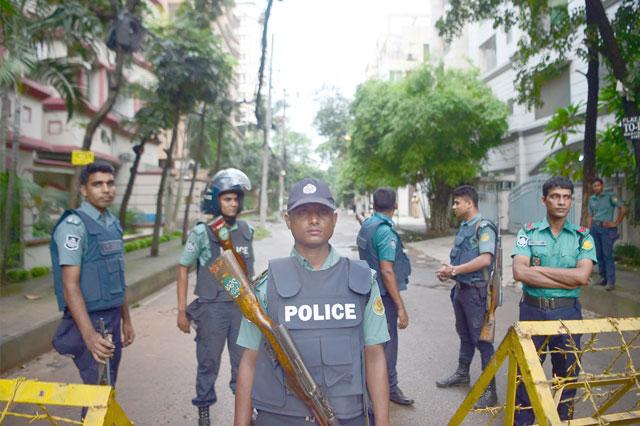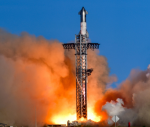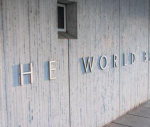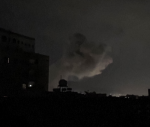You are here
Five shot dead in new deadly clashes in Bangladesh
By AFP - Mar 28,2021 - Last updated at Mar 28,2021
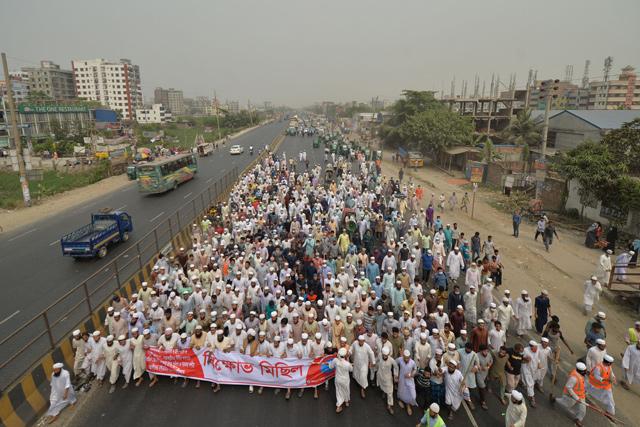
Activists of the Hefazat-e Islam, a hard-line islamist group, walk behind a banner along a road during a demonstration on the outskirts of Dhaka on Saturday a day after deadly clashes with police during a protest against Indian Prime Minister Narendra Modi visit to Bangladesh (AFP photo)
DHAKA — At least five people were shot dead as police clashed with Islamist demonstrators in Bangladesh on Saturday, a day after clashes between police and hardline Islamist protesters against a visit by Indian Prime Minister Narendra Modi left another five dead.
The violence, which began on Friday at the main mosque in the capital Dhaka, rocked several key districts in the Muslim-majority nation of 168 million.
Following Friday's fatal shootings, five more people were shot dead in new clashes in the eastern border district of Brahmanbaria, two doctors told AFP on Saturday, as police clashed with villagers and supporters of the hardline Islamist group Hefazat-e-Islam.
"Three were brought dead. Two died in the hospital. All five have gun-shot wounds," Abdullah al Mamun, a doctor at the emergency ward of Brahmanbaria 25-bed state-run hospital, told AFP.
"Another 12 were brought in the hospital with gun-shot wounds and condition of one is critical. He was shot in the head," he said.
Brahmanbaria police refused to comment on the deaths, though two officers said Islamists had staged protests in several places in the district on Saturday.
A journalist in Brahmanbaria said some 3,000 protesters including Hefazat supporters and Muslim villagers demonstrated in the district, while a doctor said protesters torched several government offices during the clashes.
Bangladesh has deployed Border Guard Bangladesh, which also acts as a reserve paramilitary force for law and order, in many parts in the country since Friday night.
Authorities also appeared to have restricted access to Facebook after images and reports of the violence were posted.
But on Saturday, thousands turned out to protest against police having opened fire and against Modi’s visit for independence day celebrations, following calls for nationwide demonstrations from Hefazat, the country’s largest hardline Islamist outfit.
Several thousand Hefazat supporters staged protests at Hathazari, a rural town outside the country’s second-largest city which witnessed the worst violence on Friday when four protesters were shot dead. A fifth protester had been killed Friday in Brahmanbaria.
Hefazat spokesman Jakaria Noman Foyezi told AFP that around 10,000 students of the Hathazari Madrasa were on the road blocking a key highway linking the port city with the country’s hill districts.
Ruhul Amin, the government administrator of the town, said Hefazat supporters put up makeshift walls and dug up the road to block traffic, but that there was no violence.
Mohammad Jahangir, a senior Chittagong police officer, said border guards, police and the elite Rapid Action Battalion have been deployed to the town.
Tear gas
In the northern district town of Habiganj, police fired rubber bullets and tear gas at some 200 protesters from the main opposition party, police inspector Syedul Mostafa told AFP.
“They became unruly and pelted rocks at us. We fired rubber bullets and tear gas to disperse them. We have arrested 10 people for violence,” he said.
In the capital itself, hundreds of Islamists gathered at the Baitul Mukarram Masjid, the country’s biggest mosque.
An AFP correspondent at the scene said the protesters, who chanted anti-Modi slogans, were Hefazat supporters.
The disturbances came as Bangladesh marked 50 years of independence, with rights groups calling for an end to growing authoritarianism including forced disappearances and extra-judicial killings.
“The scenes of violence we witnessed... follow a worryingly familiar pattern of behaviour by the Bangladeshi authorities,” Amnesty International said, referring to Friday’s violence.
“The right to peaceful protest has come under concerted attack, particularly during the coronavirus pandemic, culminating in this type of bloody repression,” said Sultan Mohammed Zakaria, a South Asia researcher for Amnesty.
Hefazat, which was behind Friday’s protests in over a dozen places, has also called for a strike on Sunday.
Hefazat is known for its nationwide network and large-scale protests demanding Bangladesh introduce blasphemy laws.
In 2013 police clashed with tens of thousands of Hefazat supporters in Dhaka, leaving nearly 50 people dead.
As well as Hefazat, a diverse range of Bangladeshi groups — including students, leftists and other Islamist outfits — have been staging protests against Modi’s visit.
They accuse Modi and his Hindu-nationalist government of stoking religious tensions and inciting anti-Muslim violence including in the Indian state of Gujarat in 2002, when 1,000 people died.
Modi visited two key Hindu temples in rural districts of southern Bangladesh on Saturday.
Related Articles
Bangladeshi Prime Minister Sheikh Hasina accused her besieged opposition rival of trying to trigger anarchy Monday as security forces clamped down on protests on the first anniversary of her controversial re-election.
DHAKA — Militants killed 20 people, most of them foreigners, inside an upmarket restaurant in Bangladesh's capital, before security forces s
DHAKA — Seven militants who killed 20 people at a restaurant in Dhaka were local Bangladeshis and authorities had tried before to arrest fiv




